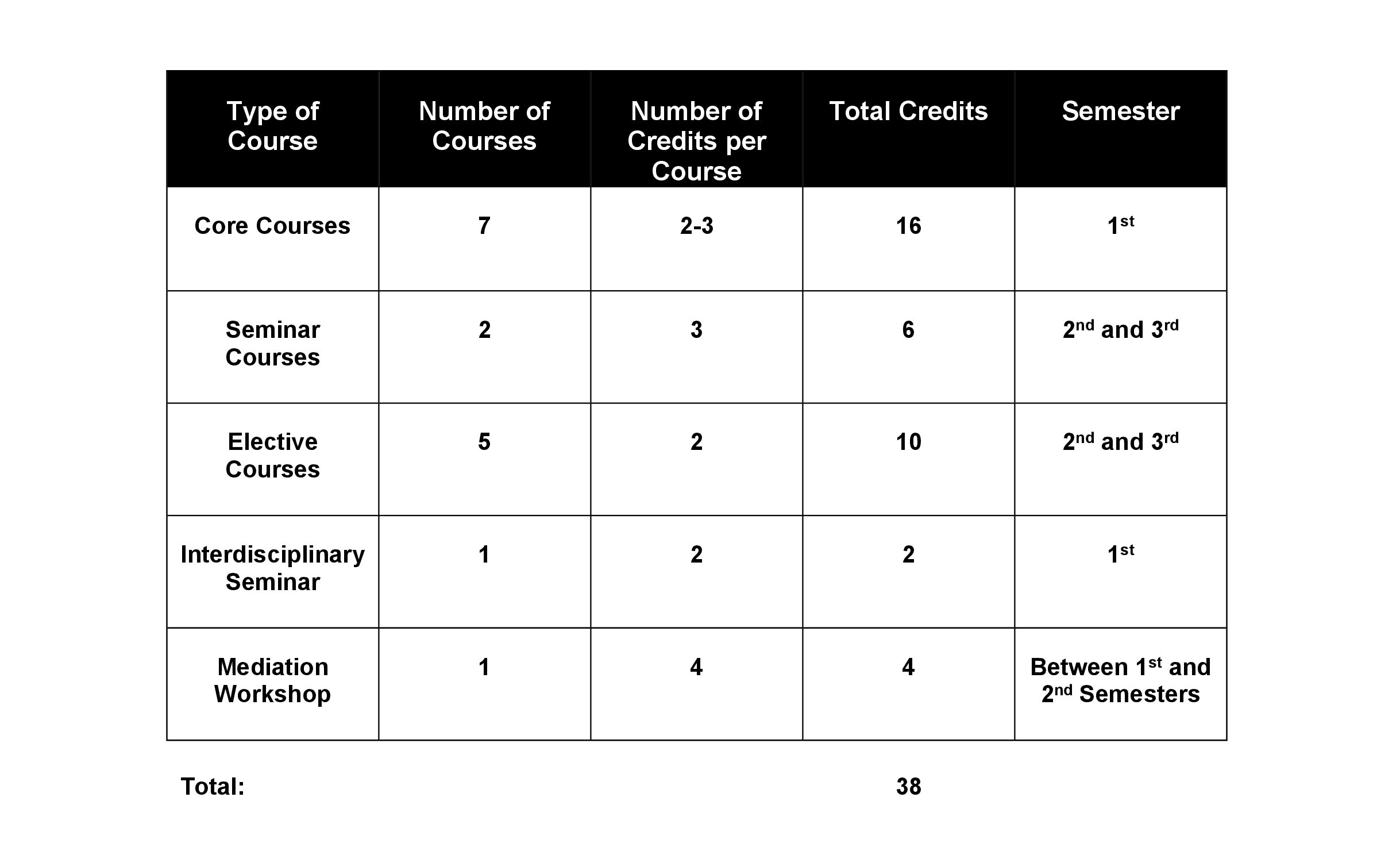Courses

Curriculum
- The International Program in Conflict Resolution and Mediation curriculum offers students a comprehensive study of conflicts and their resolution from a variety of perspectives. In addition to providing a theoretical foundation, the curriculum emphasizes development of practical skills through courses in negotiations, mediation and facilitation.
First Semester
- The first semester is dedicated to obtaining in-depth knowledge about the theoretical and practical components of conflict resolution. Lecturers derive from a variety of disciplines, including but not limited to international law, political science, public policy, social psychology, cultural anthropology, and religious studies. In the first semester, all students are registered for a course in negotiation skills. A total of seven core courses are taken in the first semester. Students also complete the Interdisciplinary Seminar, which exposes students to experts and leaders in conflict resolution as well as educational trips throughout the year.
Mediation Workshop
- Conducted in between the first and second semesters, the Mediation Workshop builds upon the material covered in the first semester while strengthening the students' negotiation skills through role playing and simulations.
Second and Third Semesters
- During the second and third semesters students choose from a variety of electives and seminar courses according to their interests. Noteworthy electives include advanced negotiations and facilitation and consensus building. These skills are integral to any future work environment. Emphasis is placed on research and analysis during these semesters. A total of two seminars and five electives are taken between these two semesters.
Courses offered by other TAU International Programs
- The International Program in Conflict Resolution and Mediation also allows students to take up to 5 credits (approximately 2 courses) offered by other Tel Aviv University International Programs based on the student’s learning goals and based on course availability. Note that not all courses are available every year. Each year a list of available elective courses are provided by the other international programs and students are notified of those courses towards the end of the fall semester. This may includes courses from the following programs: Security and Diplomacy, Emergency and Disaster Management, Middle Eastern Studies, Migration Studies and others.
Thesis Option
- Students have the option to write a thesis upon completion of their MA. For further information, click here.
Credits
- Students complete a total of 38 credit hours.

List of Offered Courses
 Courses and/or lecturers vary from year to year and are subject to change.
Courses and/or lecturers vary from year to year and are subject to change.
CORE COURSES
Principles and Processes of Negotiation in Conflict Resolution (2 credits)
Lecturer: Yonatan Kowarsky, Academic Director for Israel Center for Negotiation and Mediation, mediator/lawyer, and Supervisor and Trainer for National Mediation Program
Course Description: The course will offer to the students an in-depth understanding of the negotiation process. It will include:
- Grounds for preparation of the negotiation process, while applying a negotiation management model, based on interests and the appreciation of cognitive processes occurring while negotiating.
- An introduction to a number of tools and skills aimed to improve overall negotiation capabilities - while coping with the emotional aspects and enhancing each participant's awareness to his or hers own personal style.
An emphasis will be placed on the cultivation of long term, both business and workplace relationships. The principal premises, which will be outlined throughout the course, assume that skilled negotiators can bypass unnecessary conflicts and resolve disputes, while negotiating without the aid of third party intervention. Therefore, an outline of multi party-negotiation principles will be discussed as well.
Research Methods (3 credits)
Lecturer: Dr. Udi Sommer, Professor, Department of Political Science, Tel Aviv University
Course Description: The purposes of this course are to provide students with useful tools for engaging in empirical research in the social sciences and to help students understand literature that uses a range of research methods. Students will learn how to think about theoretical problems in terms of empirical models – theory, hypothesis testing, data collection, presentation of research, and reading and writing research papers.
This class will be divided into three parts, each refering to a specific research method: Quantitative, Qualitative and Historical.
This course will prepare students to:
- Identify and evaluate scholarship on conflict resolution and mediation.
- Design an individual research project, matching theory with the appropriate research methodology.
- Obtain and evaluate information relevant to the execution of a research project.
- Present findings from a research project.
History of the Middle East (3 credits)
Lecturer: Dr. Joel Parker Research Fellow at the Moshe Dayan Center for Middle Eastern and African Studies at Tel Aviv University.
Course Description: The course surveys the major historical processes evolving in the modern Middle East in the past two centuries. It analyzes the interaction between internal developments and Western political, economic and cultural influences.
It discusses the emergence of modern nationalism; the foundation of new states in the early Twentieth Century, their struggle for independence and their grappling with parliamentary systems under the Mandate system. It will examine the replacement of the old elites by new radical military elites, which became in turn more moderate in the course of years, as well as their confrontation with the rising tide of Islamic radicalism.
Political Approaches to the Management and Resolution of International Conflicts (2 credits)
Lecturer: Dr. Steven J. Klein, Ben Gurion University and senior editor at Haaretz newspaper
Course Description: Numerous international conflicts since the end of World War II have been managed or resolved by third parties through negotiations and various forms of interventions. During this period, the number of interstate conflicts has declined dramatically while internationalized intrastate conflicts have emerged as the dominant problem facing the international community. This course will survey a variety of political approaches and strategies for managing and resolving such conflicts.
The course will begin with a discussion of the causes of international conflicts as perceived by the major theoretical frameworks for the study of international relations, including realist, constructivist and liberal approaches. Students will learn principles of conflict, bargaining and conflict management theory, focusing on concepts such as the mutually hurting stalemate, conflict ripeness, security dilemmas, bargaining zones, reservation points, zones of possible agreement and two-level games.
Students will then explore the costs and benefits of peaceful and forceful strategies that seek to manage or resolve conflicts through democratization, the promotion of trade, ideational change and timed intervention. Specifically, the class will discuss the role of third parties – be they international institutions or individuals in resolving ethnic conflicts and deterrence, both conventional and nuclear, as a strategy to stabilize conflicts. The course will also examine the dramatic decline in interstate conflicts in contrast to the rise of intrastate conflicts since the fall of Communism, and utilizing the theoretical strategies discussed during the course, consider what lessons if any are applicable to the Middle East.
Socio-Psychological Approaches to Conflict and Conflict Management (2 credits)
Lecturer: Shira Hebel, Doctoral candidate in social-psychology, Hebrew University of Jerusalem
Course Description: How do intra-individual and intergroup processes shape large-scale conflicts, and how can we use this understanding to promote conflict resolution? This seminar introduces students to key social psychological theories and their application to the study of conflict. Topics will range from foundational social psychology concepts such as social identity theory and cognitive biases to Marmore applied areas like the role of emotions, norms, and power dynamics in conflict. The course will also explore critical issues such as radicalization, delegitimization, and prejudice, and conclude by examining psychological interventions aimed at promoting conflict resolution. Students will engage with these topics through group presentations, offering the opportunity to explore specific themes in depth and apply them to real-world conflicts.
Religious Approaches to Conflict Resolution (2 credits)
Lecturer: Professor Yitzhak Reiter, Al-Qasemi College Israel
International Law and Dispute Resolution (2 credits)
Lecturer: Ben Wahlhaus, Former head of International Negotiations and Agreements, International Law Department Israel Defense Forces
Course Description: The course provides students with a critical view of international law relevant to conflict and conflict resolution. Focusing primarily on the Arab-Israeli conflict as a case study, the course will address topics including the sources of international law, the law of sovereignty and statehood, the laws of war, acquisition and loss of territory, trust territories and rights of self-determination, the role and authority of international institutions such as the UN and International Court of Justice, international criminal law, international law concerning terrorism, and laws of occupied territories.
The Interdisciplinary Seminar Series is a mandatory 2 credit course whose goal is to enhance student’s knowledge of the conflict resolution and mediation fields and build practical skills towards excellence and mastery of the subject matter.
Over 13 sessions, this course will:
- expose students to experts and leaders in conflict resolution from a variety of fields;
- give students the opportunity to pursue their own interests through research and classroom presentations;
- fill gaps in knowledge and skills development that they would not receive in core and elective classes.
Students form a committee to decide on which activities, guest speakers, etc. to organize. Attendance is required.
Mediation Workshop (4 credits)
Lecturer:
Course Description: The Mediation Workshop examines the core concepts and principle of mediation as it applies to cases ranging from the interpersonal to international levels of engagement. The course will also study a variety of approaches or "styles" of mediation including, but not limited to, facilitative, evaluative, transformative, narrative and eclectic.
Large portions of the class will be reserved for small group role plays and other experiential learning exercises that allow students the opportunity to explore and experiment with key mediation skills, techniques and tactics.
Graduates of this course receive a certificate of completion in International Mediation from Tel Aviv University.
Students choose 2 seminar courses from the list below, for a total of 6 credits.
Environment, Conflict, and Cooperation in the Middle East (3 credits)
Lecturer: Dr. Clive Lipchin, Director, Center for Transboundary Water Management, Arava Institute for Environmental Studies
Course Description: The objective of the course is to review and discuss types, sources and aspects of environmental conflicts at the city, regional, national and mostly international level. These conflicts will be analyzed and classified by structural and subjective approaches with respect to related issues such as environmental justice, environmental awareness and planning policy as well as with respect to strategies and instruments of their resolution.
Socio-Psychological Aspects of the Israeli-Palestinian Conflict (3 credits)
Lecturer: Dr. Nimrod Rosler, Tel Aviv University School of Social and Policy Studies
Course Description: The Israeli-Palestinian conflict has always been a fascinating case study allowing for the comparative study of difficult inter-group conflicts. As many other conflicts, it rages over contradictory goals and interests in different domains and it is real. But since human beings are the ones who initiated it, take part in it, and try to resolve it, the psychological and social aspects of this conflict have to be studied as well in order to comprehend its dynamics and the various powerful forces which fuel and maintain it. This course provides students with knowledge of its psycho-social constructions as well as its functions for the involved societies. For each one of the topics that will be addressed along the course, we will present the general theoretical framework for explaining and understanding it, and subsequently implement it in the Israeli-Palestinian case using up-to-date empirical studies and opinion polls, as well as other diverse materials, class discussions and students' presentations.
Israeli Politics and Society
Dr. Udi Sommer Professor, Department of Political Science, Tel Aviv University (3 credits)
This seminar will present a rather broad, and yet very brief, introductory survey of some of Israel's major social, economic, cultural and political aspects in their respective historical developments. It will attempt to present an evenhanded view of the achievements, difficulties and failures in all these domestic areas. More specifically, it will deal with Israel's changing social, ethnic, national, religious and ideological schisms and the various policy impacts of this multicultural composition, as well as with its governmental, political, legal and military institutions and other public organizations, their functioning and their operation.
Students take 5 elective courses for a total of 10 credits.
Game Theory and Conflict Resolution (2 credits)
Lecturer: Dr. Maya Diamant, Faculty of Management, Tel Aviv University
Course Description: A conflict is an interactive situation. The course of the conflict as well as its resolution depend on the decisions made by the various parties involved. Each party, when considering its decisions, should take into account the decisions made by all the other parties. Game theory studies decision making in such interactive environments.
We will present prototypes of various games and study basic concepts required for their analysis like domination and equilibrium. Emphasize will be put on the need to change the "rules" of the game when it results in undesirable outcome, and designing rules to obtain a desired result.
We will highlight the differences between decision making of a single agent and interactive decision making, namely, a game. One of the differences is that in the first case we are aiming at getting an optimal decision. In games optimality does not always apply, and the result of games can be dismal even when all parties behave rationally. Israel, which, as the website of this program claims, is the Silicon Valley of Conflict Resolution is also the Death Valley of Frustratingly Unresolved Conflict. The frustration may partly due to the lack of understanding of the fact that in interactive situations good will and rationality do not necessarily guarantee good results.
Dangerous Group Dynamics (2 credits)
Lecturer: Dr. Alana Siegel Psy.D.Yeshiva University
This class will examine how ordinary civilians come to spontaneously or actively participate in and perpetuate anything from a negative group dynamic to mass trauma. Each class will also review interventions that can be used to prevent the emergence of a dangerous group dynamic. This class can be of use in studying the dynamics of as well as for working with groups of people.
Democracy in Ethnically Divided Societies (2 credits)
Lecturer: Dr. Steven J. Klein, Ben Gurion University and senior editor at Haaretz newspaper
Course Description: The post-WWII era saw the creation of numerous new countries that did not fit the classic nation-state model, often comprising rival ethnic groups. These internal conflicts have presented challenges to the ruling elites when interested in establishing a democratic regime. Factors such as the perceived threat by or manageability of ethnic minorities have influenced the type of democracy pursued and the extent of democratic rights afforded to these minorities. Such experiments of forging the country’s ethnic character while maintaining a certain measure of democratic institutions have had mixed results, often contributing to grievances among minority groups and at times failing to prevent bloodshed.
Palestinian Society and Politics (2 credits)
Lecturer: Dr. Khalil Shikaki, director of the Palestinian Center for Policy and Survey Research
Utilizing case studies and survey research, the course explores various facets of Palestinian society and politics today. Focus is placed on societal value system, national identity, political divisions, party and electoral systems, and state building's institutional and constitutional structures. Emphasis is also placed on the various layers of socio-political attitudes and practices such as religiosity, secularism, nationalism, sources of legitimacy, political affiliation and electoral behavior.
Strategic Communication: Strategies for governance, policy and leadership (2 credits)
Lecturer: Sarah Bard
This course provides students with the skills to develop and execute effective written, spoken and digital communication strategies for careers in the public, nonprofit, and advocacy sectors. Through practical tools and real-world applications, students will learn to craft clear, persuasive, and impactful messages that resonate with diverse audiences and advance organizational goals.
Political Psychology, Israel, and Conflict in the Middle East (2 credits) Dr. Ilai Salzman, University of Maryland
This course explores the intersection of political psychology, identity, and conflict in the context of Israel and the broader Middle East. Through an interdisciplinary lens, students will examine how individual and collective psychological processes shape political behavior, decision-making, and conflict dynamics in this region. Special attention will be given to the role of identity, memory, and emotions in shaping the perceptions, attitudes, and behaviors of Israelis, Palestinians, and other regional actors. Through readings, discussions, and simulations, students will develop a nuanced understanding of the psychological dimensions of Israeli policies and their broader implications for the conflict in the Middle East.
For information on other courses taught in English see https://en-social-sciences.tau.ac.il/courses_in_english
Before the start of the Fall Semester, intensive full-time summer language courses are available for an additional cost. Information about the summer intensive Hebrew language courses can be accessed here.
During the Fall and Spring Semesters, Hebrew classes at all levels are available:
1. Monday to Thursday morning classes (open to all)
2. Sunday Classes (open for Graduate/ Post-Graduate students only)
Fee: $500 for one semester.
Beginners Arabic courses are available as well. For further information, go to the website for Arabic studies.


